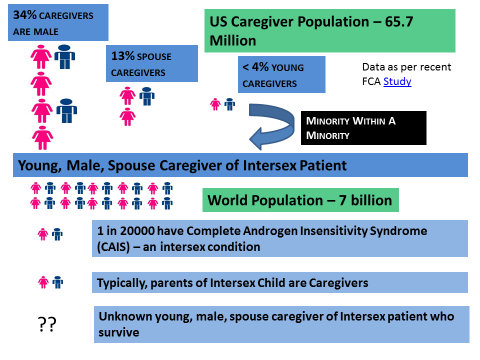 Caregivers of Androgen Insensitivity Syndrome (AIS) are an underserved group. They are a minority within a minority. Often as with other minority issues, resources are hard to find. For Caregivers of AIS, this is a double whammy as they are a minority within a minority. Given the unique situation of AIS, the relationship of the caregiver to the AIS patient is also important to take into consideration. For example, if you are a parent of an AIS patient, your needs may be different Vs. a caregiver as a trusted friend. If you are in a relationship with an AIS patient and if you are frauded, how do you handle the situation? Do you stay and become an unprepared caregiver or do you leave the AIS patient? As with any caregivers’ dilemma, these are some very moral, ethical, spiritual decisions. A salute to ALL caregivers for taking the higher road and answering your higher calling.
Caregivers of Androgen Insensitivity Syndrome (AIS) are an underserved group. They are a minority within a minority. Often as with other minority issues, resources are hard to find. For Caregivers of AIS, this is a double whammy as they are a minority within a minority. Given the unique situation of AIS, the relationship of the caregiver to the AIS patient is also important to take into consideration. For example, if you are a parent of an AIS patient, your needs may be different Vs. a caregiver as a trusted friend. If you are in a relationship with an AIS patient and if you are frauded, how do you handle the situation? Do you stay and become an unprepared caregiver or do you leave the AIS patient? As with any caregivers’ dilemma, these are some very moral, ethical, spiritual decisions. A salute to ALL caregivers for taking the higher road and answering your higher calling.
Here are top 10 tips from the perspective of an unprepared caregiver of an AIS patient who was frauded into the relationship. Some of it maybe relevant to all caregivers of AIS patients.
1. It is very traumatic for your loved one that they have AIS. It is traumatic for you as a caregiver, especially if unknowing, as well. Let the medical staff know you are a trauma patient and ask for medical help.
2. Get immediate counselling for yourself. There are an army of resources for the AIS patient. What about you the caregiver?
3. Do not worry about privacy rights of the AIS patient, tell a trusted family member for your own support. Even if the AIS patient insists on forbidding you to keep the issue private, tell them its NOT OK and get help as a caregiver.
4. Do you feel like you do not know how to react when you first get the news? Do you feel like your betrayal is less than the trauma of the AIS patient? It is NOT. As a caregiver, you need support too. Collect accurate information. There are plenty of support group sites/resources for AIS patients. If you cannot find a local Caregivers of AIS Support Group, look for a general caregivers group locally. There are several caregiver groups for cancer patients, Alzheimer patients, and other traumatic ailments. As a caregiver you can best relate to them and not the AIS support groups who mostly care about AIS patients or their parents. Hopefully our advocacy will change that and we can look forward to a more inclusive approach.
5. Be sure to educate yourself on domestic violence, ensure your personal safety from your loved one.
6. In case you are an unprepared caregiver in a relationship with an AIS patient and then found these facts, you just found out you have been frauded. Understand that in most parts of the world with decent medical knowledge, AIS is diagnosed at or near puberty. Do NOT let anyone confuse you about that. You need special support for your situation.
7. Get informed about the concealment-based approach used to treat AIS. If you are experiencing this, speak up because it is wrong against you as a caregiver. It is no longer ethical or legal to misrepresent facts on medical records because it taints documentary evidence. If any of the medical professional is engaged in secrecy and lying, go to the Ethics Committee of the Hospital or all the way to the President of the hospital if need be. With increasing activism and support, ethics committee are becoming a norm at medical facilities or the President of the medical facility should be able to address your concerns as a caregiver.
8. The AIS patients and their special interest groups will lobby hard that the gender is about how the AIS patient feels and we should respect that. Absolutely! In a civilized society, mutual respect is a must. And as an unprepared caregiver, your feelings count equally and you have the right to not be frauded before getting into a long-term relationship. That is the ethos of a civilized culture. Make sure they know your feelings are equal and just as traumatic. Do NOT get bullied.
9. Do not let your feelings be oppressed. Let it out. Find a channel. Look for peer support groups, fun activities, to keep your juices going. Keep engaged in the community. Like any other caregiver, give yourself a pat on the back. You are not alone. You are a caregiver, a survivor, a warrior. Your strength is needed for your loved one to recover.
10. If you choose to stay on as a caregiver, please visit us regularly and share your thoughts and experiences. We have very little information on caregivers of AIS patients and we can use every perspective we can get for this minority within a minority group. Growing together is the way forward.
Historically, minorities are always threatened. But it helps to get organized. It may take time and it may not happen in our lifetime. Minorities are often oppressed or persecuted or bullied before being accorded their equal rights. Looking ahead to the future, let us hope that our equal rights are around the corner and not the distant future. Let us hope that we can get past the unnecessary persecution, oppression of minorities and are afforded our inevitable equal rights as Caregivers of AIS patients.
A salute again to ALL the Caregivers for what you do regardless of the patient’s ailment.





 Facebook
Facebook GooglePlus
GooglePlus RSS
RSS Twitter
Twitter